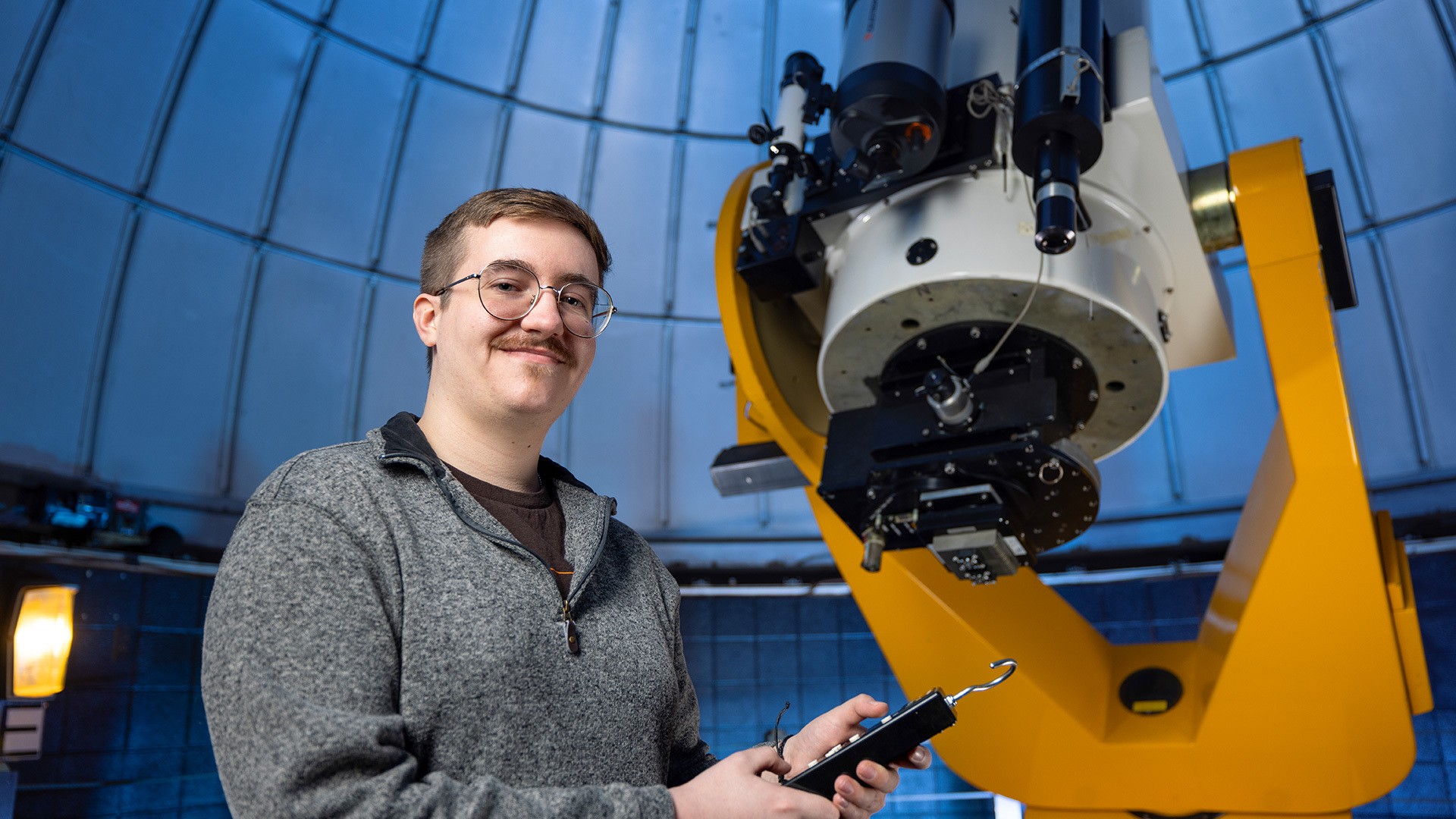
Immersive and experiential research opportunities highlight physics and astronomy track at BGSU
Estimated Reading Time:
At BGSU, students gain valuable research experience well before graduation day
By Nick Piotrowicz
At Bowling Green State University, undergraduates who are interested in astronomy don’t just learn about scientific research — they can gain invaluable research experience well before they graduate.
As part of their education, BGSU students learn from expert faculty not only in the classroom but also in laboratories, allowing them to put their studies into practice as early as their first two years on campus.
Dr. Andrew Layden, a professor who chairs the BGSU Department of Physics and Astronomy, said the opportunity to learn with and from professional scientists helps students begin to see themselves as scientists as well.
“It gets them thinking about being a scientist and helps them overcome what some people view as impostor syndrome,” Layden said. “If you’re doing science, involved in publishing science, going out and presenting your work in conferences and meeting other students and scientists in similar positions, you really start to see yourself as a scientist.
“Breaking through that barrier enables you to see the path forward — and get hooked emotionally and intellectually on the process.”
Students who intend to become astronomers typically major in physics and minor in astronomy, but picking a major is only part of a student’s academic journey.
Dr. Kate Dellenbusch, a teaching professor in the BGSU Department of Physics and Astronomy, said taking advantage of lab opportunities early in one’s college journey gives hands-on experience with the added benefit of informing future career plans.
“One of the things that’s really great at BGSU is that students in physics get to work in a lab of one of our research physicists early on,” Dellenbusch said. “We have faculty with active labs, and students — graduates as well as undergraduates — can get involved with their labs to get experience.
“That’s really important, and that gives them an idea of, ‘This is something that I really want to do,’ or gives them a better idea of what direction they would like to go.”
In Layden’s lab, being a research assistant includes activities like gathering images of the night sky with the University's telescope, analyzing the images by day to determine variations in star brightness and color and characterizing their changes over time to better understand the internal physical workings of these stars.
The chance to research alongside a practicing physicist as an undergrad is an encouraged part of the BGSU experience.
“I think that’s something BGSU does particularly well,” Layden said. “At some bigger universities where faculty spend a lot of their focus on Ph.D. students, a lot of the undergraduates don’t always get the same opportunity that we offer here.”
Hannah Means, a senior from Chardon, Ohio, who is the Society of Physics Students president, said a research experience after her sophomore year helped her home in on her niche. After accumulating a science foundation through coursework and exploring research, Means found a pathway she had not considered previously: science writing.
After speaking with faculty, Means began to focus on blending two of her passions. As a senior, she secured a highly sought-after internship with Physics Today, a publication of the American Institution of Physics.
“I’ve been writing ever since I can remember, and I had that ‘click’ moment where I realized I can put those two things together," Means said.
“I had always taken English classes and writing classes at BGSU, and it finally made sense in my head. I then applied for and got an internship with Physics Today, and I absolutely loved it. Now I’m certain that is what I want to do.”
For undergraduates interested in astronomy, Layden said the opportunity to perform research and perhaps even earn co-authorship in scientific journals is an excellent way to augment their classes at BGSU.
“It’s a really good way to start building your experience — deciding if this is something you want to do as a professional for the rest of your career — but also building a resume of successful projects completed that help you get into graduate school, then the next job and the next job,” Layden said.
“You may not do the same research professionally that you did as a first-year, second-year or even graduate-level student, but a lot of the experience and the techniques will be similar. You’re building a way of thinking and a set of skills, a set of tools you take with you for the rest of your career.”
Related Stories
Media Contact | Michael Bratton | mbratto@bgsu.edu | 419-372-6349
Updated: 04/12/2024 11:46AM




